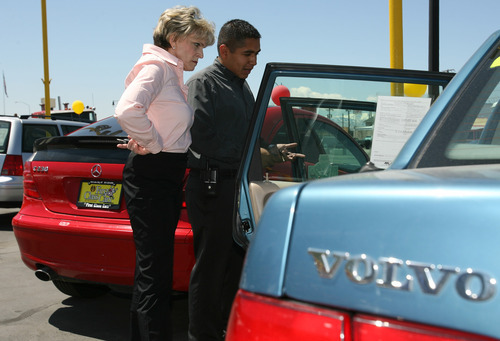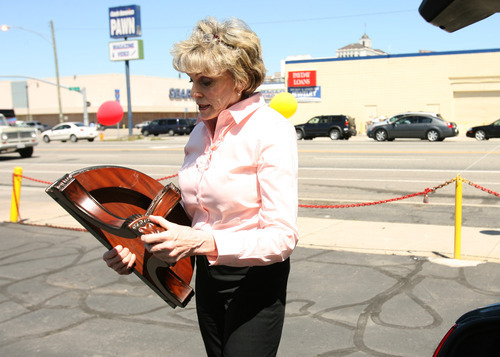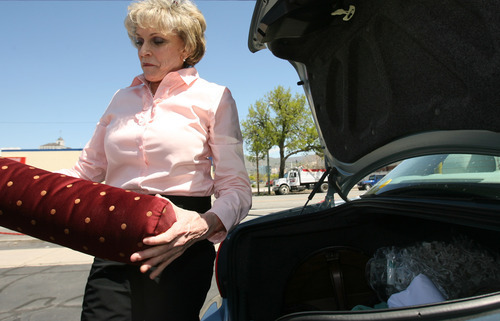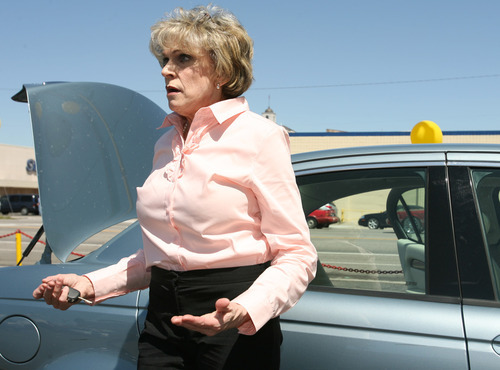This is an archived article that was published on sltrib.com in 2011, and information in the article may be outdated. It is provided only for personal research purposes and may not be reprinted.
Alma Welch, once a globe-trotting Salt Lake City Olympic booster moving among Utah's wealthy elite, has been turned out of her posh Federal Heights mansion and is struggling to pay medical bills and survive on what little remains of a once multimillion-dollar estate.
Take away the Olympic glitz and big-dollar amounts, and Welch's experience is akin to those of thousands of Utahns who built fortunes only to see them toppled by Utah's real estate collapse. More than 15,000 residents have lost their homes since 2008 and, like Welch, they often talk of divorce, medical calamity and financial miscalculation.
The 60-year-old ex-wife of prominent Olympic organizer Tom Welch is "penniless, homeless and hungry," she said last week while unsuccessfully trying to liquidate her 2003 Jaguar sedan at a discount Salt Lake City car lot. "I have $3,000 to live on for the rest of my life. And I will have $2,975 after I buy my medication this afternoon."
She also is fighting a civil stalking injunction filed by a Murray store owner, who claims Welch grabbed and shook her in a March confrontation about the sale of Welch's high-end Olympic keepsakes, items she calls "my heart and soul."
Financial records show that family members and friends — many among the state's rich and most politically connected — have sought through the years to come to Welch's salvation.
Nearly a dozen relatives and associates refused to comment for this story. Others said their attempts to help Welch had left them frustrated and estranged as they watched the former Utah hostess to international Olympic royalty "spiral down," as one supporter put it.
Another friend, well-known developer William Perry Sr., of Utah's Perry Homes, came to Welch's temporary aid in 2005 with a $575,000 loan guarantee as her debts mounted and foreclosure loomed.
"Alma has done quite a bit for this community over the years, and I think her circumstances now have made her feel like she's been taken advantage of, and therefore she's pretty protective," said Perry, whose financial backing was replaced by a family trust when things grew more dire. "It's been very hard to help her, and she has alienated a few people along the way."
Fending off creditors, Welch bounces from staying in hotels, with friends or at homeless shelters and sometimes even sleeping in her car. She tells of calling Gov. Gary Herbert for help securing food stamps. Her talkative manner can veer from nostalgia to reverie and indignation in minutes, and she confesses to being bewildered by her current plight.
"I was at the top of the world," Welch said. "If it can happen to me, if I can end up homeless, it can happen to anybody."
Alma Welch traces the peak of her arc to 1994 as she and Tom Welch prepared to fly home from the Winter Games in Lillehammer, Norway, where Utah Olympic boosters stayed at the same hotel as International Olympic Committee members.
"We were invited into the Olympic family. Our children swam with IOC children," she recalled, her eyes lighting up. "We were the anointed heirs."
Tom and Alma Welch made headlines worldwide three years later, when Tom, then the chief 2002 Winter Games organizer, was charged with misdemeanor battery and pleaded no contest to assaulting Alma during a July 9, 1997, argument in the garage of their Salt Lake City home. He resigned as president of the Salt Lake Organizing Committee, the job Mitt Romney eventually took over after the 1999 bribery scandal shook up SLOC's leadership.
The Welches' split brought her a settlement estimated at $2.2 million. In 1998, records show, she bought a 4,400-square-foot home for at least $679,300 on South Temple in Salt Lake City's historic and upscale Federal Heights.
"It was my city home," Alma Welch said. "Remodeling it became my therapy."
Through a trust set up in her name, property records show, Welch also secured an adjustable interest rate line of home-equity credit worth at least $400,000 from Zions Bank.
She concedes she was naive about money and ill-prepared to manage the loan but maintains bank officials should have known better. "Who sells a 47-year-old woman who's never had a job, with five kids in the nest, a $400,000 loan?" Welch asked. "That never should have happened."
Between 1998 and 2003, Welch racked up thousands in unpaid bills for furniture, landscaping, heating and air conditioning and architectural work, according to court records. Real estate agents later would boast of the home's grand entrance, courtyard, one-of-a-kind woodwork and the garage's stained-glass window.
Simultaneous to the remodeling, her loan payments ballooned from $1,200 to $3,300 a month, while separate investments failed to generate returns sufficient to cover debts. Her trust began defaulting on loans in mid-2004, prompting help from Perry, whose loan guarantee helped stave off foreclosure.
Despite the financial backing and legal assistance from Perry's son, Welch's financial problems persisted through 2010, when she hit a health crisis.
As Welch went into the hospital, family members and supporters created a new trust with a view to selling the home and consolidating the cash left in her accounts. Records indicate the trust was governed by her cousin, Wyoming attorney Doug Fowler; a son-in-law, former University of Utah football player and Salt Lake City mayoral candidate Molonai Hola; and a Federal Heights neighbor, influential Utah Republican and former Salt Lake Chamber President Stan Parrish.
"I took on that responsibility as someone concerned about Alma and her well-being," said Parrish, who later withdrew as trustee. "I felt that I helped to the extent that I could and I resigned. ... I'm just sorry that we couldn't be more helpful."
Trustees eventually moved Welch out of her mansion and into the Brigham Apartments in downtown Salt Lake City. But she didn't go easily. In court testimony, Welch acknowledged breaking into the Federal Heights home at least once — smashing a glass door with a sledgehammer — to retrieve her household possessions after the locks were changed.
By her own account, the trust paid her $1,000 a month, but Welch said she was cut off after refusing a request that she move again to less-expensive housing. By December, she had fallen behind on rent at the Brigham Apartments and was evicted in February.
Meanwhile, the Federal Heights home, listed at $674,900, had sold for far less. In the end, Welch's take: about $6,000.
Several friends say Welch, a housewife and one-time director of protocol for the Salt Lake Olympic Bid Committee, has not pursued suggestions she find employment. Welch says chronic and painful health conditions have made a permanent job all but impossible.
"I would love to work. I have never been a slacker," she said, adding lightheartedly, "I guess I could wear overalls and work for UTA. I have been thrown under the bus so many times, I know where all the gears are. I could be a bus mechanic."
Scraping for cash, she recently consigned a portion of her household items for sale by The Finer Consigner in Murray. One expert estimated the value of Welch's goods at more than $1 million.
Seeing the collection of fine antiques, jewelry, furs, porcelain and Olympic memorabilia in storage "was like going from museum to museum," said Utah art appraiser and dealer Chris Evans. "This stuff is so, so high-end, stuff we'll never see in a state like this again."
Constance Millet, proprietor of The Finer Consigner, now is seeking a civil stalking injunction barring Welch from the store after a confrontation over a 17th-century French cabinet holding treasured Lladró porcelain figurines given to Welch by IOC members and European aristocracy.
According to court testimony from Millet and another store employee, Welch began "screaming and yelling" during an evening visit to the store March 30, when she saw items she meant to keep instead displayed for sale. Millet claims Welch grabbed her by the upper arms and shook her as they argued about how to properly open the antique cabinet.
Millet produced pictures in court of severe bruising to both arms and alleges Welch also made threatening statements and phone calls — which Welch denied under oath.
Welch said she was in shock at seeing items dear to her offered for sale, but said she did not make a scene. "I didn't grab her," Welch said. "I touched her on the upper arms."
A judge has yet to rule on the injunction.
Meanwhile, Welch has been out of contact with key family members, in some cases for weeks, and laments surrendering the trappings of her past lifestyle.
"It will be an awful sight to see me as a bag lady," she said. "I shop at the dollar store now. It's a far cry from the Chanel store on the Champs-Elysees in Paris."
Twitter: @Tony_Semerad —
About her ex-husband and the Olympic scandal
Alma Welch's former husband, Tom Welch, was accused of corruption after reports surfaced that some International Olympic Committee members received lavish treatment from Salt Lake City and other cities bidding for the right to stage the 2002 Winter Games.
The IOC expelled some members for taking money and excessive gifts from the Salt Lake Bid Committee.
After the successful 2002 Games, a federal judge cleared Welch and fellow Olympic bid leader Dave Johnson of all wrongdoing in 2003. —
More on the Web
To learn more about foreclosure in your area, go to http://bit.ly/mbmyYL









